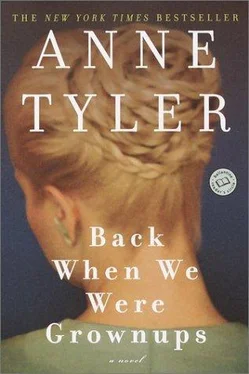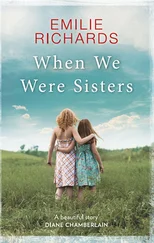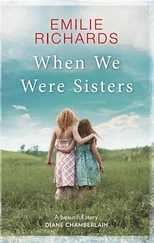“Well, thank you. Not much sense in saving this wrap, I don’t believe.” He ripped the tissue off one end and tugged the picture free. “Oh, my,” he said.
Zeb was right: the restorers had worked a miracle. The background was unblemished now, and the couple seemed somehow more alive. Aunt Joyce, slimmer than Rebecca had ever seen her, wore one of those drapey 1930s dresses that appeared to have been snatched up at the midriff and given a violent twist. Poppy was startlingly black-haired and black-mustached, and he gazed out at the viewer while Joyce had eyes only for him.
“Isn’t it amazing?” Poppy asked Rebecca. She thought he meant the restoration, until he went on. “There I am, watching the camera when I could have been looking at Joyce. I thought I had the rest of my life to look at Joyce, was why. I was thirty-nine years old. She was twenty-two. I thought she would outlive me.”
“Oh, if that is not the truth!” Aunt Ida cried from the couch.
Rebecca’s mother said, “Now, correct me if I’m wrong, Mr. Davitch, but wasn’t I once told that your wife had always had a weak heart?”
“Weak hearts ran in her family,” Poppy said. “But I never really believed that she would go first.”
“Well, anyways, she sure was pretty,” Alice Farmer said. She had crossed the room to peer over Poppy’s shoulder. “How’d a plain old guy like you come to catch such a pretty young thing?”
“She used to work behind the pastry counter at her mother’s breakfast place,” Poppy said. “Finally her mother switched her to dishing out bacon and eggs, just so I’d eat more nutritiously.”
“Very considerate of her,” Miss Nancy said heartily, and J.J. chuckled, but Poppy just stared at the photo as if he hadn’t heard.
Then the door slammed against the closet, and he straightened and said, “Ah, well.”
First came NoNo with a sweater she’d been laboring over for months — a bulky white fisherman’s knit, not really Poppy’s style. He was nice about it, though. “You made this?” he asked her. “You hate to knit! You swore you’d give it up after you finished those baby booties.”
“Well, this time I will give it up, I promise,” NoNo said, and she bent to kiss his cheek.
Peter shook Poppy’s hand and said, “I’m supposed to tell you happy birthday, and that me and the other kids are going in on one big present from the bunch of us.”
“Well, that’s all right, then,” Poppy decided.
Peter was wearing his school blazer, the sleeves a good inch shorter than the last time Rebecca had seen him in it. It matched J.J.J.’s, she realized. They must go to the same school, for they seemed to know each other. J.J.J. made room for him on the couch, and they put their heads together over some kind of gadget that Peter pulled from his pocket. “I think the way I can get it to work is by differential friction,” Rebecca heard him say.
Biddy arrived with still more pastry boxes — having brought most of the food earlier that morning — and headed for the kitchen, followed by Dixon, who first set a wooden keg just inside the front door. Troy, however, came straight into the parlor to hand Poppy a small, flat package. “Your old friend Haydn,” he explained. “Biddy’s gift is the food, but I wanted you to have something especially from me.”
Poppy hadn’t always seen eye to eye with Troy (he had suggested more than once that a timely stint in the Army would have set him straight), but he seemed pleased when he unwrapped the CD. “Oh, one of my favorites,” he said. “The Military Symphony!”
Rebecca shot Troy a suspicious look, but he just smiled at her. “Why don’t I put it on,” he said, and he took the CD from Poppy and went over to the stereo.
Then Patch and her family arrived, and then Min Foo and hers. For several minutes, the foyer was wall-to-wall people. Children were struggling out of jackets; Abdul was cooing in his infant seat; Patch was having a tantrum over something insulting Min Foo had just said. (How had Min Foo had time, even?) “Come wish Poppy a happy birthday,” Rebecca told them. “Emmy! Are you wearing heels ? Hakim, let me take the baby while you… Patch, please, come on in and tell Poppy happy birthday. I’m sure Min Foo didn’t mean whatever it was.”
“Min Fool, is more like it,” Patch snapped, but she trailed the others into the parlor, where Biddy had started circulating a platter of petits fours and Dixon was passing macaroons.
The party had changed to the stand-up kind, now that there was a crowd. Only the older ones stayed seated — Poppy receiving greetings benignly from his wing chair. Mr. Ames was telling Aunt Ida that he was choosing Poppy’s birth date for his next lottery number. Mr. Hardesty was asking the room at large who on earth all these people were.
Patch handed Poppy a gift so heavy he almost dropped it. And no wonder: he unwrapped it to find ankle weights, shaped like big blue doughnuts. “For your daily walk,” Patch explained. “They’ve just completed a study that proves…”
Then Dixon hauled in the keg, which turned out to contain the children’s present — a giant collection of horehound drops, Jujubes, Allsorts, Good & Plentys, and other candies, some of which Rebecca had assumed to be obsolete. Dixon pried off the lid and held up various samples while Poppy made appreciative remarks. “ You helped buy me this? And you?” he asked various youngsters, skillfully avoiding the use of any names. “Oh, my, sassafras balls. How did you know I love sassafras?” In fact, his enthusiasm was probably genuine; this may have been the most successful gift yet.
Hakim’s videotape, on the other hand, bewildered him. He unwrapped it and peered at it doubtfully. “ Paul P. Davitch, ” he read out, “ 1954–1967. What? I don’t understand.”
“Those are the years covered by the videotape,” Rebecca told him. “Hakim took all our home movies to a shop where they turn reels into tapes. Remember Uncle Buddy’s home movies?”
“Oh, yes. Yes, indeed,” Poppy said.
Uncle Buddy was Mother Davitch’s brother, the one technically minded member of the family, and when he died, in 1968, the movie camera might as well have been buried with him. Nobody had been certain how to work the projector, either; so this tape caused considerable interest. Children were called together and arranged on the floor, and chairs were dragged in from the dining room, and Mr. Hardesty’s walker was placed to one side. Zeb, Dixon, and Troy — the three tallest — retreated to the back of the group. Then Rebecca started the VCR.
First there were the usual hurdles — a black-and-white snowstorm, a duel between the two remote controls until the snowstorm disappeared, a pause while a child was sent off to silence Haydn. Eventually a white calling card came into focus with Paul P. Davitch, 1954–1967 engraved in flowing script. The next card read Photography: William R. “Buddy” Brand, and the next, Produced by Big Bob’s Production Service —all of these accompanied by a piano playing “Stardust.” October or November, 1954, the last card read.
Whatever scientific advances had restored Poppy’s engagement photo were evidently not available to Big Bob, because the people who filled the screen were bleached nearly white and shot through with darting white lines like slants of rain. Poppy stood on a brownish lawn with a plumper, dowdier Aunt Joyce, her knees like two underbaked biscuits below the cuffs of her long Bermudas. In front of them, hunched over the handlebar of a tricycle, was a small black-haired boy who would have to be Zeb. All three of them had their faces screwed up against the sunlight. “Would you look?” Poppy murmured, but he was the only one who seemed affected by this oddly unmovie-like shot. The younger children stirred restlessly, and a woman — perhaps Miss Nancy — was heard to ask, “Was there ever a less attractive fashion era than the fifties?”
Читать дальше












